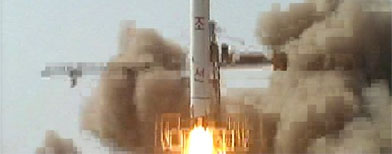 North Korea has reportedly begun fuelling a rocket for a launch next month, defying calls to abort an event the West says is a disguised missile test, as the United States suspended planned food aid.
North Korea has reportedly begun fuelling a rocket for a launch next month, defying calls to abort an event the West says is a disguised missile test, as the United States suspended planned food aid. "The launch is coming closer. The possibility is high that the launch date will be set for April 12 or 13," Japan's Tokyo Shimbun reported Thursday, quoting a source "close to the government" in Pyongyang.
It cited the source as saying that North Korea had begun injecting liquid fuel into the rocket.
South Korea's defence ministry said Sunday the North has transported the main body of the rocket to a site in the far northwest of the country in preparation for blast-off.
Japan's newspapers pay close attention to North Korea and often break stories on the secretive state. South Korea's Joint Chief of Staff said it could not confirm the report.
North Korea insisted this week it would go ahead with what it calls a peaceful satellite launch, snubbing a call from US President Barack Obama to drop the plan and accusing him of a "confrontational mindset".
The United States has suspended plans to send food aid to North Korea, saying it has broken a promise to halt missile launches and cannot be trusted to give the aid to those who need it, a Pentagon official said Wednesday.
Under a deal reached last month, North Korea had agreed to a partial nuclear freeze and a missile test moratorium in return for 240,000 tonnes of US food aid.
The West and North Korea's Asian neighbours have urged the nuclear-armed state to scrap the launch, which is seen as a pretext for testing ballistic missile technology that is banned under UN resolutions.
South Korea, China and Japan will hold talks in eastern China next month on regional security and cooperation, and the rocket plan is certain to be discussed on the sidelines, Seoul's foreign ministry said Thursday.
Preparations for the event "have entered a full-fledged stage of action", Pyongyang said last Friday. It will commemorate the 100th anniversary of the birth of founding president Kim Il Sung, grandfather of current leader Kim Jong-Un.
The North insists it has a right to launch a civilian satellite and says it will estimate crop yields and collect weather data.
The home-built satellite will also assess the country's forest coverage and natural resources, the official news agency said late Wednesday in another attempt to stress the purportedly peaceful nature of the exercise.
The satellite weighs 100 kilograms (220 pounds) and will follow a "solar synchronous orbit" at a height of 500 kilometres (around 300 miles), with a lifespan of two years, it quoted an unidentified senior official from the Korean Committee for Space Technology as saying.
The North has said it has invited experienced space experts and foreign media to observe the operation.
The Philippines on Thursday reiterated concern over the threat of debris falling from the rocket, which is projected to land at sea about 180 kilometres northeast of the main Philippine island of Luzon.
"Our main concern here is the debris. If it explodes in the air, where will all that metal fall? We should know so that we will be able to warn all those who could get hit," Defence Secretary Voltaire Gazmin said in Manila.
The North fired off long-range missiles in 1998, 2006 and 2009. After the two most recent launches it swiftly followed up with an underground nuclear test and some analysts see a similar scenario unfolding this time.
But the timing of the latest announcement, just 16 days after disclosure of the US deal, has puzzled many and led to speculation of factional conflicts. Obama said Sunday it was not clear who was "calling the shots" under the young new leader.
Analyst Andrei Lankov, of Seoul's Kookmin University, said the North's mixed signals could reflect poor inter-agency coordination or clashes between different factions.
"The military is always eager to flex its muscles and given that they have much of the power in this closed system, Kim Jong-Un might have decided to placate them," he wrote in a Wall Street Journal article.
"If this is true, it strongly suggests the insecurities of the baby-faced dictator."
No comments:
Post a Comment